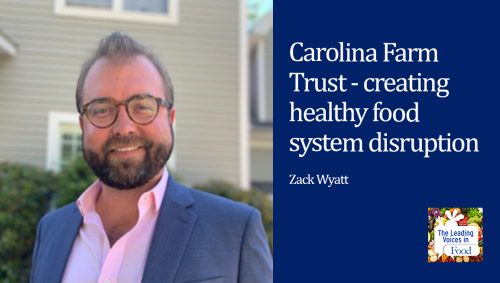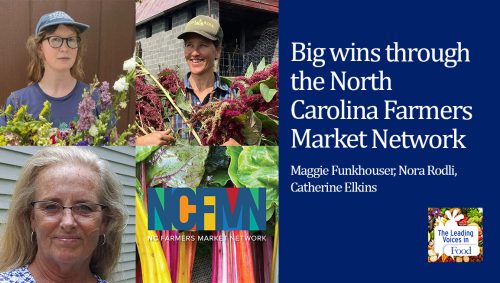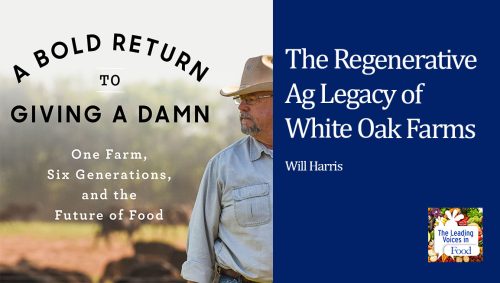The Leading Voices in Food
E86: How One NC Farming Business is Weathering the COVID-19 Pandemic
This podcast is part of a series on the impact of the COVID-19 pandemic on our food system. And in this interview, we’ll be exploring how one North Carolina farming business has coped with the unique challenges of the pandemic and particularly disruptions to longstanding markets and supply chains for farm products. Our guest is Jim Warenda from Wilson, North Carolina. Jim runs a diverse organization that includes Fresh-Pik Produce, the Southeastern Growers Association and Dean’s Farm Market. He’s also the President of North Carolina’s Strawberry Association.
Subscribe: Apple Podcasts | TuneIN | Google Podcasts | SoundCloud | PocketCasts | Radio Public
Tags: Agriculture & Tech | COVID-19 Pandemic Impacts on Food | North Carolina | Voice of Farming |

Jim Warenda has been in the produce industry for 25 years. I am the Operations Manager and Sales Director At Fresh-Pik Produce Inc. Fresh-Pik Produce farms 1100 acres of produce, has retail stores Deans Farm Market , and a marketing division, Southeastern Growers Association, which markets for other growers in the eastern United States. Born and raised in the farming town of Wilson, NC he quickly returned back to his hometown after receiving a Bachelor of Science from Elon University. He has served on numerous boards and has been the President of the North Carolina Strawberry Growers Association for the past 3 years. In his spare time he enjoys hunting, fishing, and being with his wife and 2 children.
Interview Summary
Jim, help our listeners understand a bit more about your enterprise.
I’ve been in the farming industry since I was 14 years old, topping tobacco. One of the last people to hand crop tobacco, probably. Kind of goes back that far, and then we got interested in produce. We’ve grown and diversified from farming and the nursery business and a direct store retail business to the actual consumer and started a marketing association where we market for several other growers here.
Jim, I’m curious about how diversified your organization is now. And I’d like to know a little bit more about how you pulled all that together.
So Fresh-Pik Produce was the first farm that was created, where we direct store delivered to Piggly Wigglys, IGAs. We helped create Southeastern Growers Association in 1997, where we put together a grower base, started a marketing co-op that’s still in existence today, so that we could distribute to direct store chains to their distribution centers so that we could grow, get larger, and not have to have the infrastructure to direct store deliver. So, it allowed us to gain more volume and more market share. We grow about 20 different commodities, strawberries, watermelons, cantaloupes, lettuce, sweet corn, collards, and cabbage are our main commodities. So, we distribute watermelons pretty much East of the Mississippi from Florida to Canada. Whereas our strawberry marketing is from our area here to Philadelphia, to South Jersey. Our lettuce goes to chop plants to your bag salads, to retail vendors, Food Lions, Harris Teeters, those types of chains also.
I want to focus now on the impact of the pandemic. So earlier this year, food supply chains were disrupted as many cities and states went into lockdown trying to slow the spread of the COVID-19 virus. So what was that like for your organization?
Markets changed overnight. We deal with US Foods, FreshPoints, Syscos, those types of people, which all of a sudden overnight their restaurant business is cut out. They’re getting shut down, so that cuts some of our business back. But at the same time, we’re fortunate enough to be with all our retailers, with Food Lions, Harris Teeters, John Foods, you know, those types of retailers, you know, we were able to step in and actually help them, their business grew 40% overnight. Their distribution centers couldn’t handle that. So we were able to obtain places for them to bring some of the commodities into our facility and redistribute them to their direct stores. We were very fortunate in the position that we were in and partnering with the retailers that we did. We’ve created a full-time kitchen. We have a full-time chef. We have a full time sous-chef. So we’re doing value-added products now at our retail stand. We’ve moved to prepared meals and park-up meals where people can pick those up and shove them in the oven. Squash casseroles, collared dips, have been kind of a hit . We do lasagnas, meatloaves, and that’s been really good during this time too. People love to come pick up meals and go eat them in their house like that. Takes a lot of attention to detail. It’s a lot of work. There’s a lot of great employees down there that put in a lot of time and a lot of effort to make things happen. We did not have to let anyone go. We kept everyone here, and that was one of our promises to our employees. We were not gonna stop, and even if we had to stop, I mean, everyone was gonna be paid and we were gonna keep moving forward. It’s been fun. It’s been interesting. It was a quick change, but farmers or farmers are used to changing quickly. If you can evolve with the changes, usually you can survive.
I know that in the early days of the pandemic, there were a lot of uncertainties about how the virus was transmitted and how best to protect people. How did those concerns translate into your business? For instance, what about personal protective equipment or distance between employees or other food safety regulations?
The retailers already had a path that they wanted us to take already. We’ve been doing third-party audits since 2002. So most of the food safety aspects and those types of things we’ve been doing normally for 18 to 20 years now. So the thing that we had to come was masks, separation, taking temperatures every day and documenting those things with our employees. Those things were just simple moves for us.
And what about your direct sales consumer marketplace?
Dean’s Farm Market, our retail stand is just like a grocery store. We had to shut down for two weeks. We implemented face masks. We closed down the store to drive-through service. Had to gain more employees to help. We boosted up our internet capabilities so that people could order a better online and that we can have people’s orders ready when they drove up so that we didn’t have lines wrapped around. At the same time, the pick your own and the agritourism’s a huge side of that business, instantly, we lost that. We could have done the pick your own. NC State put together a program and the proper protocols to do pick your own, which a lot of people did successfully. But we’re a little bit larger than most of the strawberry base and have a little bit more outside that we didn’t want to lose and didn’t want to risk, so we just decided to unfortunately, close the pick your own. Which you know, some people were upset about, ’cause it’s been a big deal. This pick your own has been going on since 1962. And people have family pictures . They take their kids every year and that’s a big deal. And we do a lot of stuff that way, but when the risk was just a little bit more, than the rewards, unfortunately we had to shut that part down. So that was a big loss. But our customer base here in Wilson, they supported us really well. and we have now since reopened. But there’s still plastic windows in front of the cash register. She’s having to sanitize her hands, every time she touches cash. There’s social distancing, not letting too many people in the store and all that stuff is still in place. And I think that’s gonna become more of a normal. Hopefully, we see it relax a little bit. But I think we’re gonna continue this for some time, just because we don’t want to get out of practice, ’cause this is obviously not ended yet.
I think many farmers have gone into agritourism as a way to diversify their business, but it’s certainly not been a revenue generator this year. Tell me how your farm got engaged in agritourism.
So yes, we started as a grower, but we knew we needed to diversify and a gentlemen said it, miles down the road, he had a retail stand. He had a cucumber grader, and he was looking to retire and he grew about five acres of strawberries that had the agritourism semi-started. So that was kind of our last diversification because at that point we had the farm, we had the marketing division and then that got us into the retail side. That also put us into the capabilities of moving the farmer’s markets. And we have about four or five different retail locations as well.
Jim, you’re involved in several farm grower and marketing associations. What role did those organizations play during the early days of the pandemic?
Well, the North Carolina Strawberry Association, as well as the Watermelon Association, the Vegetable Growers Association, it gives you kind of an infrastructure and a meeting place where you have instant contact with growers, giving them information to your NC State. They’d gotten together, put some stuff in place within a day or two. And we already had the capabilities of moving that to our base and then that allowed them to implement the right protocols for their farm to let them move through this successfully. So there has been a few hiccups at some of the farms where some growers had workers come in that tested positive for COVID. But luckily we had already had some infrastructure in place of the correct things and the correct measures to do, which I think helped save, the strawberry season is such a short window. And most of the strawberries in the North Carolina are direct-marketed strawberries. There’s not many strawberries that do go to food service or your chain store-type stuff. It’s mostly pick your own or own farm experience. Knock on wood, it’s been great.
You’ve mentioned the value of the associations for sharing out information, but what can you tell us about your markets during this period?
We’ve been very fortunate to be in the position that we are. Some of the retailers we’ve been working with for 25 years and the connections that we have, have really shown how much a friendship and how much things are worth working with these people for so long.
How do you see COVID changing farm markets in the short and long term?
Yeah, I think a lot of change is going to come with COVID. I think our retailers nearby are going to align with food service industry type people that didn’t have the business and they’re going be better set up for when this happens again. It’s hard to say what people should do in the future. I mean, I think first step for a lot of growers in our area or on the East coast is doing the proper food safety protocols and having those already set up. That’s federally mandated and that’ll be done with by, I think, it’s 2024. That’s 95% of this game. Finding the proper PPE during something like this is obviously a challenge. Now we, we have our normal avenues, but you know, those avenues also got exhausted. We came close to not having some of the proper stuff, but fortunate enough, we’re already in contact with those people, whereas, if you weren’t doing food safety-type stuff prior to this, and weren’t using gloves and hand sanitizer and soaps and stuff like we’re already using, that’s what escalated the consumption, which drove supply chain down.








